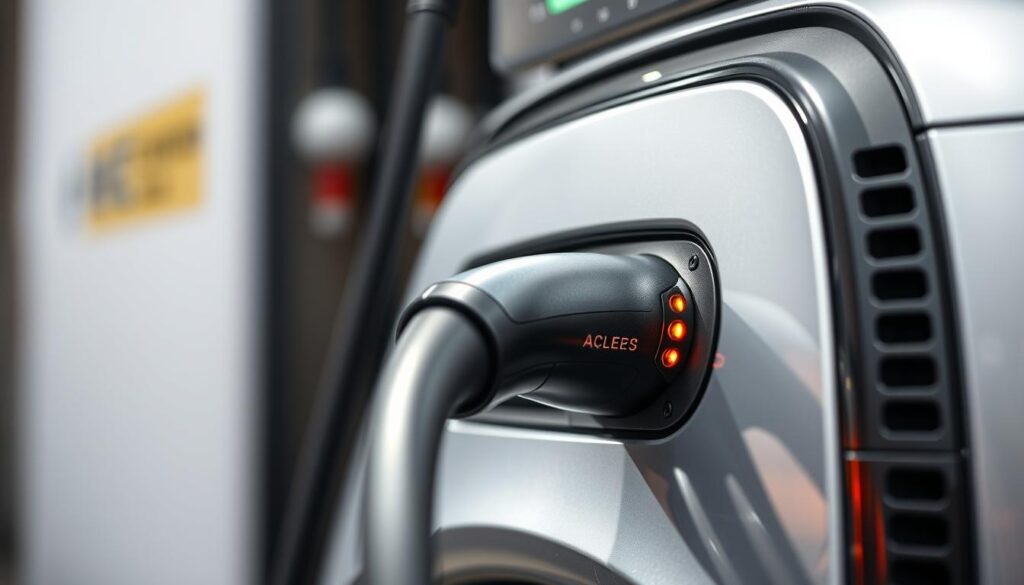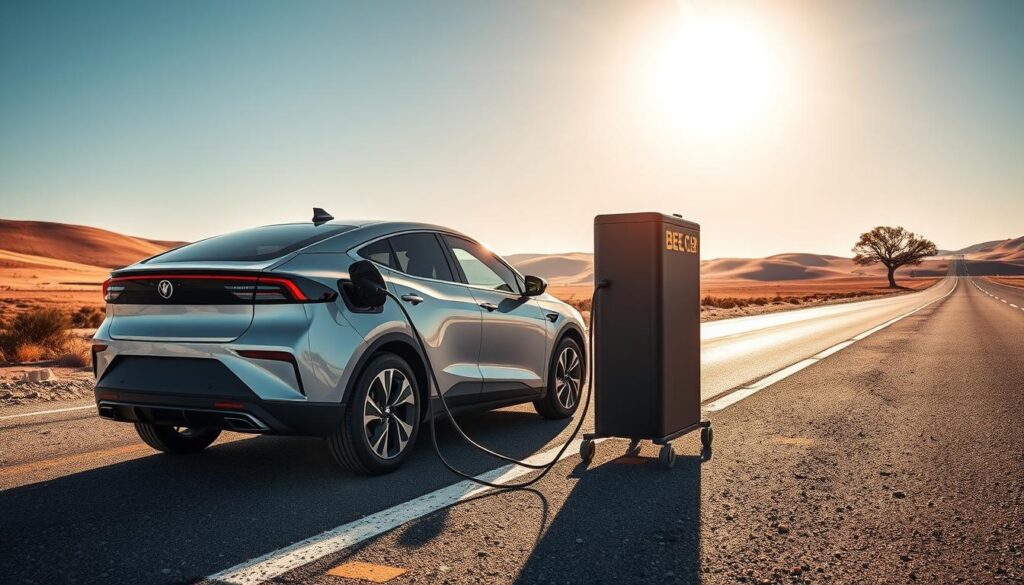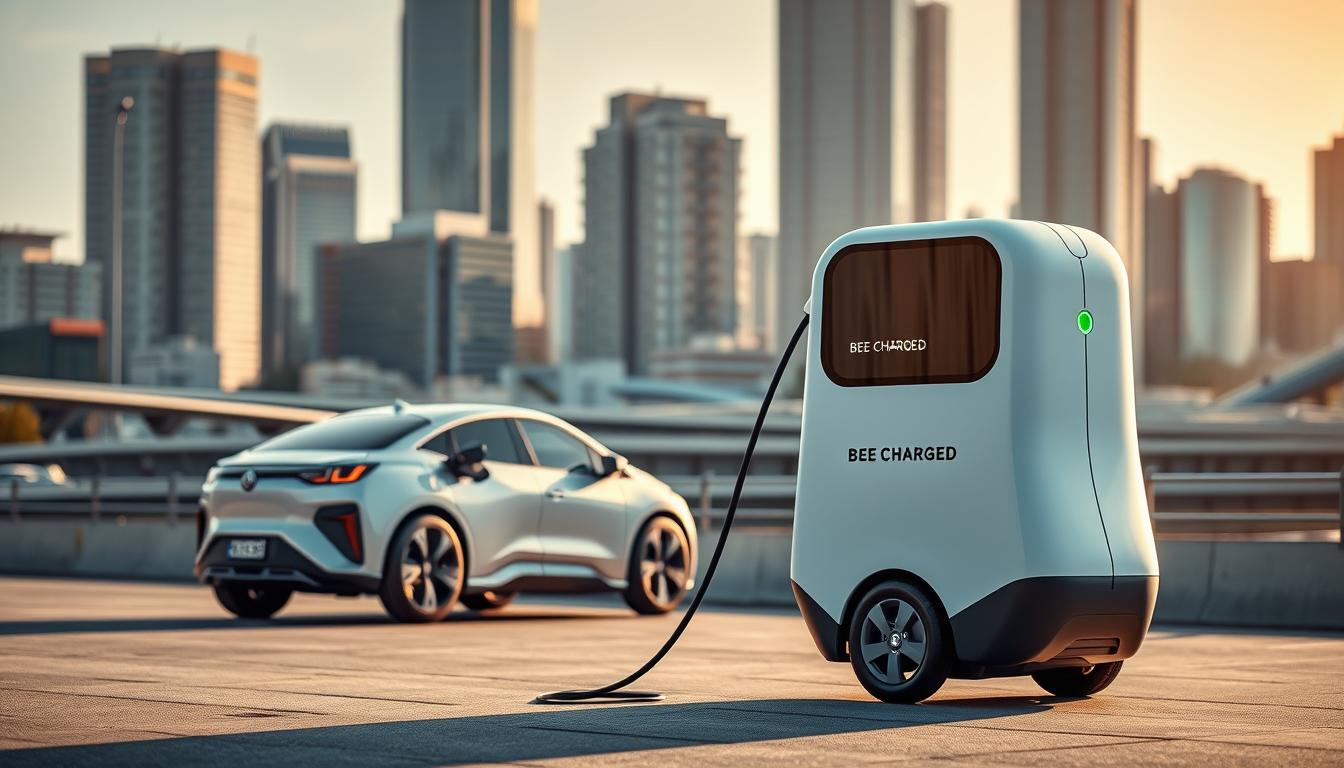The shift to electric vehicles (EVs) has brought new ways to recharge. Mobile EV chargers are becoming a key part of this change. They offer a mix of convenience and flexibility for EV drivers.
These portable chargers help solve problems faced by EV owners. They also help make electric vehicles more popular worldwide. We’ll explore how mobile EV chargers fight range anxiety and improve the driving experience. You’ll see how on-demand EV charging is changing the future of charging.
Key Takeaways
- Mobile EV chargers offer flexibility and convenience for electric vehicle owners.
- They provide an effective solution to range anxiety, allowing drivers to charge on the go.
- Portable charging technology is transforming the way we think about vehicle energy replenishment.
- The demand for on-demand EV charging options continues to rise as electric vehicle adoption grows.
- Mobile chargers can play a vital role in supporting commercial fleets.
The Rise of Mobile EV Chargers
Electric vehicle adoption is growing worldwide. This is due to more people caring about the environment, new tech, and government support. Now, people want reliable ways to charge their cars, leading to the rise of mobile EV chargers.
These chargers make it easier and more convenient for EV drivers. They offer a flexible solution to the need for charging on the go.
Overview of Electric Vehicle Adoption
More people are choosing electric cars. Car makers are offering a wide range of electric models. This meets different tastes and needs.
Government incentives help too. They offer financial help to encourage people to buy electric cars. This shows a big move towards cleaner transport.
Introduction to Mobile EV Charging Technology
Mobile EV charging technology is leading the way. It provides portable charging solutions, making transport more sustainable. These chargers are easy to use and fit into daily life.
As this tech gets better, it solves the problem of running out of charge. It makes charging easy and accessible for everyone.
How Mobile EV Chargers Work
Mobile EV chargers have changed how we power electric vehicles (EVs). They offer a new way to charge cars, different from traditional methods.
Understanding DC Fast Charging
Mobile EV chargers use DC fast charging technology. This method sends energy straight to the car’s battery. It’s much faster than older ways of charging.
With this technology, drivers can quickly top up their batteries. This is a big improvement over older charging methods.
Comparison to Traditional Gas Cans
Mobile EV chargers are different from traditional gas cans. Gas cans rely on finding a gas station, which can be hard. Mobile EV chargers offer more flexibility and convenience.
They can be used in many situations, like roadside assistance. This means drivers don’t always need to go to a gas station.

Mobile EV Chargers Are The Gas Cans Of The Future
Portability is key for electric vehicle (EV) drivers, helping them deal with range anxiety. The fear of running out of charge far from a station holds them back. Portable charging solutions give drivers the security and flexibility traditional stations can’t match.
Why Portability is Key for EV Drivers
Portability in EV charging is more than just a perk. It helps overcome the limits of traditional charging stations. Mobile chargers can be used anywhere, making quick and efficient charging possible. This is crucial for long trips or city driving, easing the worry of being stuck with a dead battery.
Addressing Range Anxiety with On-Demand Solutions
On-demand mobile charging is a big step in fighting range anxiety. It lets drivers get help when and where they need it, changing how they see charging. No more planning routes around charging stations. Drivers can now drive without worry, knowing help is just a call away. This innovation boosts EV adoption by making things more accessible and convenient.
Emergency EV Charging Solutions
Electric vehicles are becoming more common, and the need for emergency EV charging is growing. Roadside assistance providers are now offering quick and effective services for electric vehicle drivers. Mobile chargers are key in helping stranded EVs get back on the road fast.
Utilization in Roadside Assistance
Mobile emergency EV charging systems are vital for roadside assistance. They are portable and efficient, helping service providers meet EV drivers’ needs quickly. In just minutes, these systems can get a non-operational vehicle running again.
This not only makes customers happier but also makes the roadside assistance process smoother.
Case Study: Lincoln’s Velion 50kW Charger
The Velion 50kW charger by Lincoln Electric is a great example of how technology can improve emergency EV charging. It costs around $21,000 and can quickly give electric vehicles the power they need. Tow companies and emergency fleets find it useful because it’s easy to set up in the field.
The Velion charger meets the need for fast and effective charging solutions. It can give enough power to charge electric vehicles on the go, reducing wait times for drivers in trouble. As electric vehicles become more popular, using mobile chargers like the Velion 50kW charger ensures drivers are never left stranded.

Mobile Charging for Fleet Operations
Switching to electric vehicles in commercial fleets is a big chance to make operations better and more efficient. Mobile charging for fleets brings new ways to keep vehicles charged without a lot of downtime. This approach helps businesses save money, be more sustainable, and work better.
Benefits for Commercial Fleets
Mobile chargers offer many benefits to commercial fleets, including:
- Increased Flexibility: Portable charging units can be used anywhere, making charging easy.
- Reduced Downtime: Charging on-site means vehicles can keep moving, cutting down on downtime.
- Cost Efficiency: Using mobile charging can save a lot of money by avoiding big charging setups.
- Improved Sustainability: Switching to electric vehicles with mobile charging helps the environment.
Integrating Mobile EV Chargers into Fleet Management
Adding mobile EV charging to fleet operations needs careful planning. Businesses should consider these steps:
- Assess Fleet Needs: Look at what charging each vehicle needs based on how they are used.
- Choose Appropriate Technology: Pick mobile charging that fits the fleet’s size and tech needs.
- Train Staff: Make sure team members know how to use the mobile chargers right.
- Monitor Performance: Use tracking systems to see how charging is going and make it better.
By using mobile charging for fleets, companies can work better and be more eco-friendly. With the right steps, businesses can improve and help the planet at the same time.
Future Trends in Mobile EV Charging
The future of mobile EV charging looks bright. It will see big charging innovations that make things better for users and the planet. As tech gets better, we’ll see changes that meet the needs of electric car owners.
Charging Innovations on the Horizon
New tech will shape the future of mobile EV charging. We’ll see faster charging and easier-to-use systems. Better battery management and smart chargers will make charging fit into our lives better.
- Improved mobile app integration for real-time charging station availability
- Innovative energy management solutions to minimize costs
- Integration of renewable energy sources into charging networks
Potential for Off-Grid Charging Solutions
Off-grid charging is becoming more popular, mainly for those in remote spots. It lets drivers use solar and wind power. This makes them more independent and helps the planet.
| Type of Charging Innovation | Feature | Benefit |
|---|---|---|
| Fast Charging Stations | Reduced charging time | Increased convenience for users |
| Mobile App Integration | Real-time data access | Enhanced user planning and efficiency |
| Off-Grid Systems | Renewable energy harnessing | Environmental and cost benefits |
The future of mobile EV charging will change the car world a lot. Keeping up with these changes will help businesses and people move towards a greener future.
Challenges and Considerations
Mobile EV charging looks promising for electric vehicle users. But, it faces many challenges. One big issue is the cost. Businesses and consumers need to understand the financial side before investing.
The price of devices like the Velion can be a big obstacle. This makes it hard for many to adopt this technology.
Cost Implications for Consumers
The cost of mobile EV chargers often stops people from buying them. They offer convenience, but the initial cost is a big hurdle. We need to look at more than just the price.
Things like maintenance, installation, and upgrades also matter. It’s key to decide if the long-term benefits are worth the cost.
Regulatory and Infrastructure Challenges
There are also regulatory challenges in mobile EV charging. Without clear rules, building the needed infrastructure is slow. A supportive regulatory environment is crucial for success.
It helps foster innovation and investment in networks. Overcoming these regulatory hurdles is essential for better integration of mobile charging.
Conclusion
Mobile EV chargers are changing how we move and use energy. As we move towards a greener future, these chargers will play a big role. They help in emergencies and support the growing need for electric cars.
It’s important for people and businesses to invest in these chargers. They help make travel better and use energy more wisely. As electric cars become more common, these chargers will be key to our progress.
In short, knowing about mobile EV chargers is key for using electric cars well. They help us grow in a sustainable way. Using these chargers is essential for a successful electric car future.
FAQ
What is mobile EV charging?
Mobile EV charging is a way to charge electric vehicles (EVs) when they’re not near a charging station. It uses portable chargers for emergency or on-demand charging.
How does mobile EV charging work?
Mobile EV chargers use Direct Current (DC) fast charging. This means they can charge EVs quickly, without needing the car’s onboard charger. This makes charging faster and more convenient.
What are the benefits of using mobile EV chargers for fleets?
Fleets benefit a lot from mobile EV chargers. They reduce downtime, offer flexible charging locations, and boost efficiency. This keeps commercial EVs ready to go.
Can mobile EV charging solutions help mitigate range anxiety?
Yes, they can. Mobile EV charging gives drivers peace of mind. It ensures they can charge when needed, reducing worries about running out of power.
What challenges are associated with mobile EV chargers?
Challenges include the high cost of devices and regulatory hurdles. Overcoming these is key for mobile EV charging to become more common.
How do mobile EV chargers compare to traditional gas cans?
Mobile EV chargers are more convenient than gas cans. They offer quick charging without the need for gas stations. This makes energy replenishment easier and faster.
What are on-demand EV charging services?
On-demand EV charging services let drivers get help when they need it. It’s a convenient way to get charged, perfect for emergencies.
How are mobile EV chargers utilized in emergency situations?
In emergencies, mobile EV chargers like the Lincoln Electric Velion 50kW DC Fast Charger help. Roadside services use them to quickly charge dead EVs.
Are there any innovations on the horizon for mobile EV charging?
Yes, the future looks bright. Expect better charging tech and infrastructure, including off-grid solutions. These will power EVs in remote areas.
Where can I find mobile EV charging services near me?
Look online for providers near you. Services like BeeCharged offer emergency EV roadside assistance and mobile charging.

